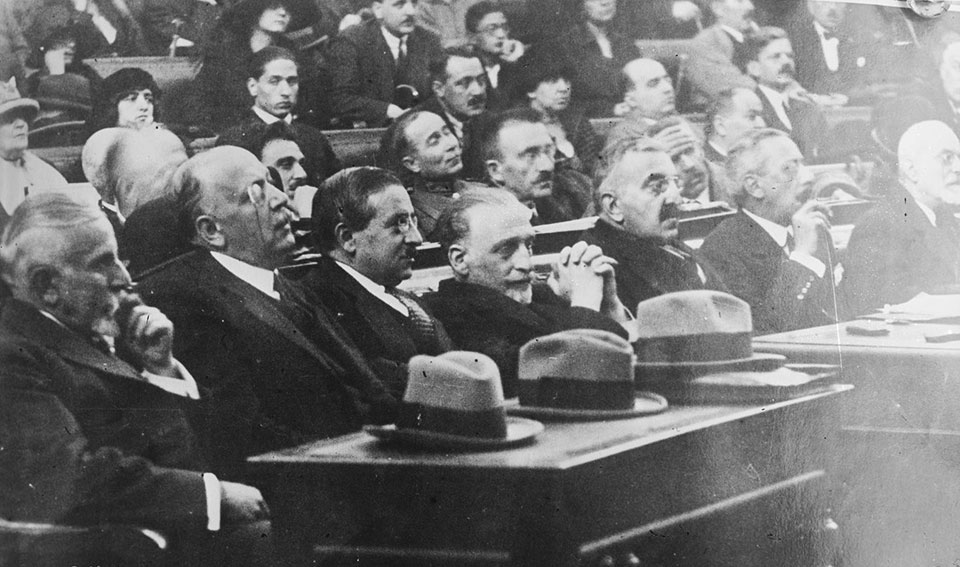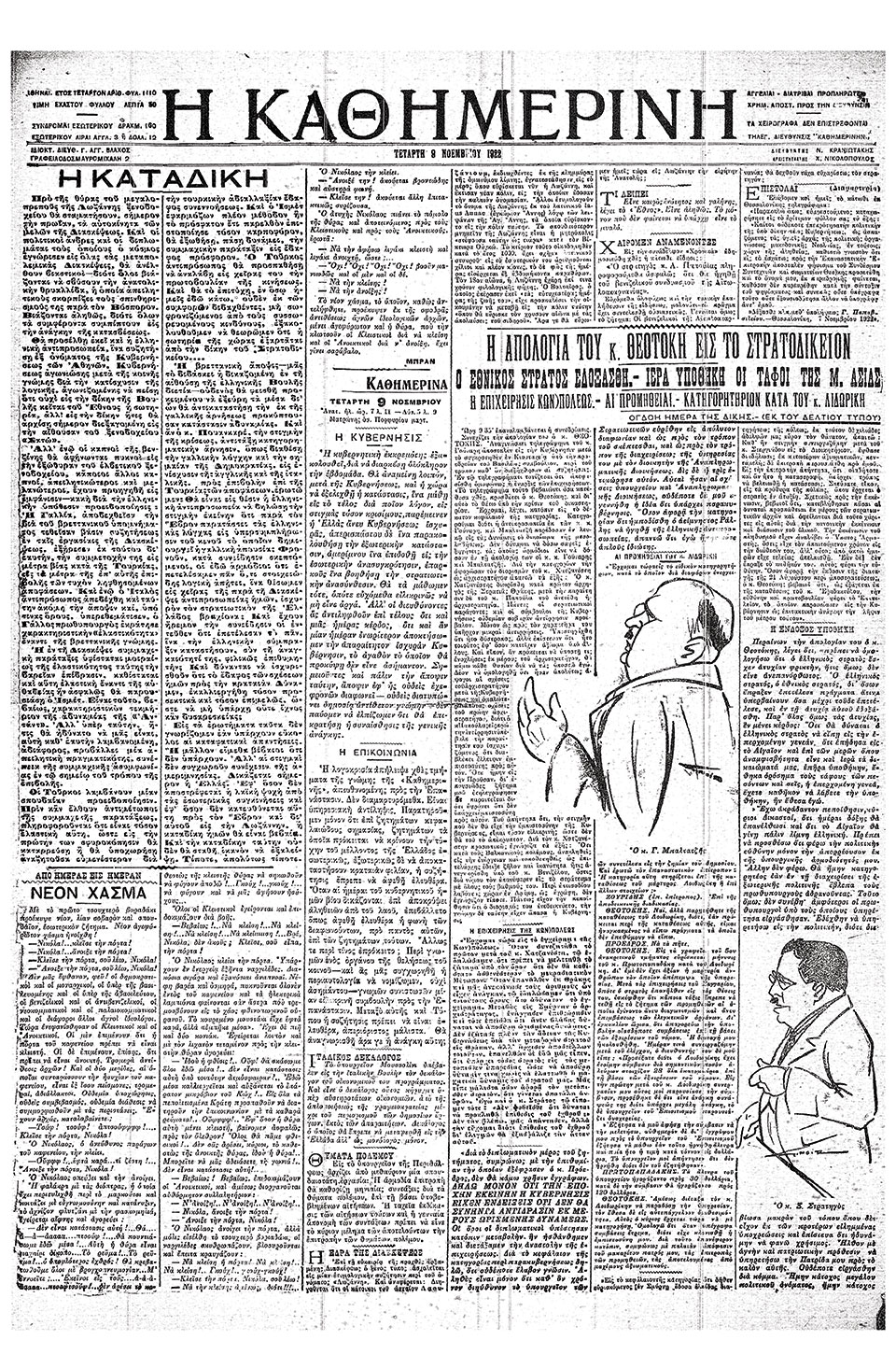
When the Geodetic Mission (later the Geodetic Detachment and the Army Mapping Service) was formed under the leadership of Er. Born on July 7, 1869 in Corfu, the general had just graduated from the Evelpidon School (1890).
During the Greco-Turkish War of 1897, he served on the staff of the heir Constantine, who after the war sent him – along with Metaxas and Papavasiliou – for further training at the Military Academy in Berlin. When he returned (1903) he joined the Army General Staff and was one of the officers tasked with reorganizing the army.
An employee of the General Staff during the Balkan Wars, together with Daglis, Metaksas and Dousmanis, in 1913 he was promoted to lieutenant colonel, then served as his deputy, and from August 1916 (after the removal of Dusmanis and Metaksas) – chief.
A few months before this (May 1916), Fort Rupel was surrendered to the German-Bulgarian troops without a fight. In the Rupel case, he was taken to court (Ex-Staff Trial, October 1919 – January 1920) along with Dusmanis, Metaksas, Geksadaktylo, where he was found not guilty. In his apology, he claimed that “The Staff Orders were the result of government decisions” and stated: “I protested against the accusation of Germanophilia brought against me. But from that moment, until I have formed the idea that it is impossible for me to live under the Venezuelan regime and commit treason, gentlemen, the distance is great” (“I Kathimerini”, 01/30/1920). At the time of his trial, he had no military service. He resigned after the return of Eleftherios Venizelos to the post of prime minister (June 1921) and was then sent into exile in Crete.
In his book Greece in Asia Minor (1925), he characterizes the Treaty of Sevres as a “diplomatic masterpiece” and a “philological relic”, which, however, “does not predict or regulate how the Turks will be forced to submit to an endless population” (p. 133 ). From this he concludes that he was a “mortal” and “military consul”: “he blinds from the point of view of external phenomena […] but under the deceptive cover of a myriad of muzzles of guns and cannons, ready to spew fire and iron” (p. 134).
Classmate and friend of Ioannis Metaxas, member of the General Staff during the Balkan Wars, member of the United Opposition and MP for Corfu in 1920.
He participated in the formation of the United Opposition – he was a member of its council – and in the elections that won for her on November 1, 1920, he was elected a member of parliament from Corfu.
In the words of the General (pp. 143-147), subsequent governments found themselves in a tragic dilemma: “Before this state of affairs, there were two possible paths for post-embryonic governments: either to continue the Asia Minor policy or to immediately stop its withdrawal from Asia Minor.” The first path was chosen – “because the penitentiary regime was unable to continue the policy of Asia Minor bequeathed to it” – for three reasons, he argues. Firstly, because it was necessary to solve “a terrible and tragic from all points of view question about the fate of the Greek population there, which will remain unprotected and defenseless.” Secondly, because otherwise “Greece would have to cancel the promises which she officially made through Mr. Venizelos to the Powers, that is, to impose the terms of the Treaty on Kemal.” And, thirdly, because “the army in Asia Minor up to this point felt victorious and dominant in Asia Minor, not foreseeing the immediate danger of defeat or expulsion. […] it would be difficult for him to convince the need for evacuation from Asia Minor by arguments of future dangers alone. The argument in question has been characterized as “a hodgepodge of real reasons and rationalizations” (Sot. Rizas, The End of a Great Idea, Kastaniotis, p. 193).
The general initially supported this choice as a deputy. However, in March 1921, he was recalled to the army – “at the insistent request of Mr. Gunaris,” he said in an apology at the “Trial of Six”, – in the rank of lieutenant general, in the position of deputy chief of the General Staff (under Dusmanis) and government connection with the army of Asia Minor (in a role not institutionally defined). He stayed there shortly after the battle of Sangarios. In the above apology, he continues: “My service at the army headquarters continued until the end of September. Back in Athens, I was looking for and settling into retirement. However, this decree was canceled three days later at the request of Mr. Gunaris, who insisted that I follow him to London as military adviser to the mission. My services in London were not serious.”
Returning from the English capital, he took the post of Minister of Transport in the last government of Gunari (02/03/1922) and in the government of Protopapadakis (09/05/1922).
After the destruction of Smyrna and the upsurge of the movement, on September 11, 1922, he was arrested, tried and sentenced by the Extraordinary Military Court (Trial of Six) to life imprisonment and demotion. In his defense, he claimed that he was opposed to the appointment of the main strategy of Hadzanesti “because of his exclusivity and the strict and one-party method that he applies”, while in his second statement he claimed that “he had an accident because that he studied in Germany and because he served in the Headquarters, to be characterized as a Germanophile.” In addition, he denied the accusation that he was a “slave” and added that “under the system, he has always opposed the imposition of any services on Dousmanin.” After an amnesty in 1924, he left for Switzerland to be treated for a severe form of tuberculosis with which he had contracted. He died March 11, 1927 in Davos.
Great balancer
“My attitude towards K. Dusmanin was diametrically opposed. And this opposition manifested itself when the king went to the front. Explaining the King’s transfer to the front, he says that he thinks that due to the King’s health and other international conditions, he was not admitted. However, after the decision was made to transfer him, he came to the conclusion that he should not take another position or that of army commander. “The government agreed with my opinion. However, Mr. Dousmanis said, they want a royal commander in chief and want the existence of a General Staff, like during the Balkan wars. I looked at it with awe. Because I knew the army had a well thought out plan of operations. For the most part, the opinion of Mr. Dousmanis prevailed. For this reason, and from the first moment, conflicts began between the management of the Army and the Headquarters. I was in such a position that I always tried to reconcile the currents “” (“General apologies before the trial of the six”, “I Kathimerini”, 09/11/1921).

Greek army offensive champion in Ankara
At the time when General Xenophon went to Asia Minor (March 1921), the question of moving to the east was raised, while the command of the Asia Minor army was cautious, as they considered the Turkish forces to be well organized and with high morale. The general did not share this opinion: “The idea that Greece would be able, even if it were fortified in it, to hold the belt of Sevres or other surroundings, with the entire Asian mass on its back, is so trivial and infantile in a military way, so that the discussion of a matter as clear as day becomes dim. Asia Minor is not divided geographically, and either he must own it entirely, or, if he wants to occupy only part of it, he must have power at all times, like a European state, to protect it even during a blow. his faithful Asiatic tumor in his heart” (p. 204). That is, the general justifies the attack on Ankara by reversing the argument that Metaxas used when expressing his objections to military intervention in Asia Minor (hence his refusal to take over the main strategy when he was offered at the end of March 1921).

And this is at a time when a new stage of mobilization is beginning (which produced 58,000 men), but he finds that “the formation of new units required new artillery, with similar ammunition, new orcs of engineering services in general, new connections with appropriate means of transport , that is, it required a huge new organization, and if we assume that the supply of supplies is possible and easy, then it would be physically impossible to carry out before the passage of a long time, maybe more than a year ”(pp. 202-203). In the same spirit and at the same time, Metaxas expressed the question “how was such a great undertaking, i.e. occupation of Ankara by such weak forces.” When the meeting of Kiutahiya took place (07/15/1921), only a few months had passed – a period much shorter than that which the general considered necessary for the proper preparation of the Asia Minor army. In addition, the Greek army was strained by the first phase of summer operations in 1921, which began at the end of June. However, he himself at the meeting was very clear in favor of an offensive against Ankara, an operation launched with the aim of defeating the Kemalist forces or even capturing Ankara. Although he acknowledged the “difficulties” (mainly supplies), he even maintained in 1925 that the need for this “was obvious.” First of all, it was a military necessity: “Kemal’s temporary military weakness, the overall difficult internal situation and its seriousness make the operation absolutely necessary militarily!” And secondly, since it “provided the maximum likelihood of success”, it was feasible: “These two facts, that is, the excellent military position on our part and the extremely disadvantageous position on the part of the enemy, provided the greatest probability in favor of a successful exit
enterprises” (p. 243-252).
Source: Kathimerini
James Springer is a renowned author and opinion writer, known for his bold and thought-provoking articles on a wide range of topics. He currently works as a writer at 247 news reel, where he uses his unique voice and sharp wit to offer fresh perspectives on current events. His articles are widely read and shared and has earned him a reputation as a talented and insightful writer.